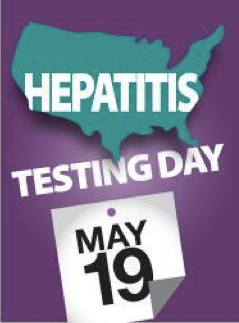
Observing National Hepatitis Testing Day
 Observing National Hepatitis Testing Day
Observing National Hepatitis Testing Day
Dr. Ronald Valdiserri
Next Monday, May 19th, is the third national Hepatitis Testing Day, established to raise greater awareness of an epidemic that is too often unrecognized.
Millions Living with Undiagnosed Infections
There are approximately 3.5–5.3 million Americans living with chronic viral hepatitis, but most of them do not know that they are infected since it may take decades for the virus to cause liver damage severe enough to cause symptoms. Unaware of their infection, they are at risk for severe, even fatal, complications from the disease and can spread the virus to others. Untreated chronic viral hepatitis represents the leading cause of liver cancer and the most common reason for liver transplantation in the United States. In addition, it is a leading infectious cause of death in the U.S., claiming the lives of 12,000-18,000 Americans each year.
Hepatitis Testing Day Badge
Too many Americans at risk for or living with hepatitis B or hepatitis C infections remain uninformed about life-saving facts, including the need for testing and care, the associated adverse health effects, and the availability of treatment that can prevent liver damage, cirrhosis, and even liver cancer.
Populations at Greater Risk for Viral Hepatitis
“Baby Boomers” are disproportionately affected by hepatitis C infection. According to the CDC , almost 3 million adults in the U.S. are infected with the hepatitis C virus, and most of them are baby boomers. In fact, people in this age group are five times more likely to have hepatitis C. That is why both the CDC and the U.S. Preventive Services Task Force recommend that all Americans born from 1945-1965 (the “baby boom” generation) get tested for hepatitis C—even if they don’t have an obvious risk factor. The Surgeon General also recently urged physicians and other health care providers to test all baby boomers for HCV infection.
Other groups at increased risk for viral hepatitis include Asian Americans and Pacific Islanders, African Americans, people living with HIV, persons who inject drugs, gay and bisexual men, immigrants and refugees from parts of the world where hepatitis B is endemic, and homeless individuals and families.
Raising the profile of these infections and the importance of testing, through the observance of Hepatitis Testing Day, can help generate greater awareness among the public and health care providers, encourage more people to learn the basic facts about viral hepatitis, and persuade patients to discuss viral hepatitis testing when they see their health care providers.
Take an Online Hepatitis Risk Assessment to See if You Should be Tested
A brief, confidential online Hepatitis Risk Assessment tool developed by the CDC allows individuals to determine their risk for hepatitis B and hepatitis C by answering questions privately, either in their home or a health care setting. Persons who take the assessment can then print the tailored recommendations based on the most up-to-date guidelines, and discuss viral hepatitis testing and vaccination (for hepatitis A and hepatitis B) with their medical provider.
Viral Hepatitis Action Plan
Hepatitis Testing Day was established as part of the nation’s first Action Plan for the Prevention, Care and Treatment of Viral Hepatitis. That plan was recently updated and details specific actions to be undertaken by federal agencies and non-federal stakeholders, between 2014 and 2016. An important priority of the Viral Hepatitis Action Plan is to decrease health disparities and raise greater public and health care provider awareness—especially among those populations most affected by hepatitis B and C infections.
Many of the federal partners working to implement the Action Plan are joining in the observance of Hepatitis Testing Day, raising awareness among their staff, grantees, providers, clients, and other stakeholders. Doctors, nurses, pharmacists, clinics, health departments, community-based organizations, and others from across the country are invited to join in these efforts.
In addition, many health departments, community-based organizations and others are offering free hepatitis screenings in conjunction with Hepatitis Testing Day. Learn more about these and other awareness activities, taking place in communities around the country on this page from CDC.
For more information on Hepatitis Testing Day, visit http://aids.gov/news-and-events/awareness-days/hepatitis/.
For more information on the Viral Hepatitis Action Plan, visit www.aids.gov/hepatitis.